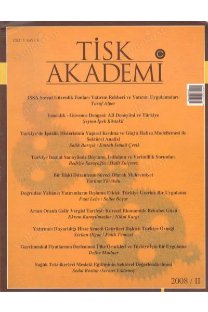Türkiye'de İkiz Açıklar Hipotezi: 1989-2005
İkiz açıklar hipotezi kamunun bütçe açıklarının cari açıklara neden olacağını belirtir. Diğer taraftan eğer Ricardocu Eşdeğerlik Hipotezi geçerliyse bu iki değişken arasında herhangi bir ilişkinin olmaması da mümkündür. Bu çalışmada bütçe açıkları ile cari açıklar arasındaki ilişkinin dinamikleri kısa ve uzun dönem için analiz edilmiştir. Yapılan analizler, göstermiştir ki uzun dönemde reel bütçe açığı ile reel cari açık arasında bir ilişki bulunmamaktadır. Fakat VAR sisteminden elde edilen bulgulara göre reel bütçe açığındaki artış, kısa dönemde reel milli geliri ve reel cari açığı arttırmaktadır. Sonuç olarak ikiz açıklar hipotezinin kısa dönemde geçerli olduğu ama uzun dönemde geçerli olmadığı söylenebilir.
Twin Deficits Hypothesis and the Case of Turkey: 1989-2005
Twin deficit hypothesis mainly states that government budget deficits will cause current account deficits. On the other hand if Ricardian equivalence hypothesis holds it is also possible that two deficits are not related at all. In this study the long-run and the short-run dynamics of the relationship between current account and budget deficits are analyzed. Our analysis showed that there is no longrun relationship between the two deficits. But the evidence from VAR system supports that an increase in the real government deficit stimulates the real national income and the real current account deficit. Therefore we have concluded that the twin deficit hypothesis holds in the short-run but not in the long-run.
___
- Akbostancı, E. ve G. İ. Tunç (2002), "Turkish Twin Deficits: An Error Correction Model Of Trade Balance", METU Economic Research Center Working Papers in Economics 01/06.
- Aksu, H. ve S. Başar (2005), “İkiz Açıklar Hipotezinin Türkiye Açısından Araştırılması”, İktisat, İşletme ve Finans Dergisi, Yıl: 20, Eylül, ss. 109-114.
- Barro, R. J. (1989), "The Ricardian Approach to Budget Deficits", Journal of Economic Perspectives, Cilt: 3, No: 2, ss. 37-54.
- Bilgili, E. ve F. Bilgili (1998), “Bütçe Açıklarının Cari İşlem Dengesi Üzerindeki Etkileri: Teori ve Uygulama”, İktisat, İşletme ve Finans Dergisi, Yıl: 13, No: 146. Ek, ss. 4–16.
- Darrat, D.A. (1988), “Have Large Budget Deficits Caused Rising Trade Deficits?”, Southern Economic Journal, Cilt: 54, ss.879-887.
- Enders, W. ve B.S. Lee (1990), “Current Account and Budget Deficits : Twins or Distant Cousins”, The Review of Economics and Statistics, Cilt: 72, No: 3, ss. 373- 381.
- Feldstein, M. (1986), "The Budget Deficit and The Dollar", NBER Working Paper, No: 1898.
- Feldstein, M. (1992), “The Budget and Trade Deficits Aren’t Really Twins”, NBER Woking Paper, No: 3966.
- Granger, C.W.J. and P. Newbold (1974), “Spurious Regressions In Econometrics”, Journal of Econometrics, Cilt: 2, ss. 111-120.
- Johansen, S. ve K. Juselius (1990) , “Maximum Likelihood Estimation and Inferences on Cointegration—with applications to the demand for money,” Oxford Bulletin of Economics and Statistics, Cilt: 52, ss. 169–210.
- Khalid, A. M., T. W. Guan (1999), “Causality Tests of Budget and Current Account Deficits: Cross-country Comparisons”, Empirical Economics, Cilt: 24, ss. 389-402.
- Kuştepeli, Y.R. (2001), "An Empirical Investigation of the Feldstein Chain for Turkey", Dokuz Eylül Üniversitesi İşletme Fakültesi Dergisi, Cilt: 2 No: 1.
- Niskanen, W. A. (1988), "The Uneasy Relation Between The Budget and Trade Deficits", Cato Journal, Cilt: 8, No: 2, ss. 507-518.
- Zengin, A. (2000), “İkiz Açıklar Hipotezi (Türkiye Uygulaması)”, Ekonomik Yaklaşım, Gazi Üniversitesi, Cilt: 2, No: 35, ss. 37-67.
- İnternet Adresleri
- www.dpt.gov.tr
- www.imf.org
- www.tcmb.gov.tr
- ISSN: 1306-6757
- Yayın Aralığı: Yılda 2 Sayı
- Başlangıç: 2006
- Yayıncı: Türkiye Isveren Sendikalari Konfederasyonu
Sayıdaki Diğer Makaleler
İşyerinde Psikolojik Taciz (Mobbing) ve Hukuki Sonuçları
Carry Trade: Gelişmeler ve Riskler
Reklam Planlaması ve Etkinliğinin Ölçülmesi Üzerine Bir İnceleme
Türkiye'de İkiz Açıklar Hipotezi: 1989-2005
Türkiye'de Uluslararası Sermaye Hareketleri Faiz İlişkisi: (1992-2005 Dönemi VAR Analizi)
Türkiye'de Çocuk ve Yoksulluğu: Ölçüm Yöntemleri ve Yoksulluğun Belirleyicileri
